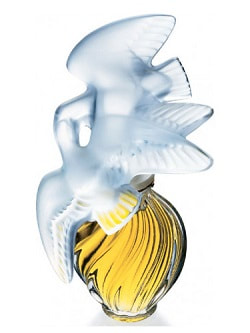 Sometimes we want to write about people we have lost who were close to us. Author Jonas Hassen Khemiri says in a recent interview with The New Yorker: "What kind of memories do we cling on to? ... Whenever I have lost someone, my first impulse has been to try to collect all my memories of that person and write them down. Almost as if in a naïve attempt to render them immortal." Khemiri's words make me think of the need we have to remember that person in our words, the feverish impulse we experience to write everything down, to capture the person and keep them alive in our memories. I have been working on a book about my Mom who passed away in 2010. I have to say that the words have not come in an impulsive rush. They have been slow to arrive, and it is not easy writing, but it is something I need to do. The last thing I bought Mom before she passed away was a bottle of L'air de Temps fragrance. It was a strange request from her, as she'd always been a Chanel No. 5 kind of gal. I sometimes think it was the fancy bottle that had attracted her in the past as I know she had worn this fragrance from time to time. My mother had always stressed the importance of perfume. "I'd spend my last dime on a bottle of good perfume," she'd say, "so that I could at least smell expensive." We were clearing her room at the hospital after she had passed away and I saw the L'air du Temps on the table. I took it home with me and I still have it. The perfume is rather stale now, but it does still have that delightful, flowery lightness that uplifted my Mom and made her feel good. Whenever I take off the top and smell it, I think of her. There are so many ways we can remember people in our writing - we can describe them, how they looked, what they said and believed; or, like magpies, we can collect things, objects that when seen, can evoke memories of the person to whom they belonged.
0 Comments
 Expect the unexpected. Be ready to let memories flow, triggered by the most extraordinary circumstances, events, chance meetings, 'blasts from the past.' Write the stories that come to your mind. Here's one. Back in the late 70's I worked at McFarlane's Fisheries, packing oceans of schnapper for export and earning money for university. McFarlane's was located across the road from Auckland's Victoria Park on the corner of Fanshawe and Halsey Sts. I did it for a couple of summers, and occasionally on weekends during the year. The pay was pretty good for the time, but the work wasn't that nice. Every morning we'd put on a white smock, a funny hairnet hat thing, white gumboots, ankle-length plastic apron, and rubber gloves, then tromp out onto the floor to begin work for the day. Trucks would bring fresh fish up from the wharves and dump their loads out on the concrete floor. The fish lay there in their own slime amidst a sludge of brown, melting ice. We had to bend down, grab them by their tails, and fling them, according to size, into the appropriate plastic bin. Slime flew as the fish sailed through the air. Our arms become puckered with their scales. We also had wooden picks (just a piece of wood with a sharp nail point protruding from the end) to snag the fish with. We were told never to puncture the eyes, as this was part of the fish's allure for the Asian market. The fish were then placed into steel trays, loaded onto trolleys, and carted down to a huge blast freezer where they were frozen solid. Then these blocks of whole fish would be packed into boxes and shipped off to Japan. At the time McFarlane's was also researching the health benefits of the green-lipped mussel, producing a product called Seatone which is still widely available. I seem to remember it had particular benefits for arthritic joints. McFarlane's had an old boat called the Shenandoah, taking researchers and employees out to the mussel farm in the Hauraki Gulf and one day, two of us were asked to go along and paint the inside of the cabin while under way. Stuck below with diesel fumes and no ventilation, we cared little about the suffering because it was extra pay and out of the packing shed for the day. John Croft, one of the scientist/researchers, was on board that day. He was a young Englishman, very exuberant and so friendly and cheerful, good looking too. We all liked him very much because he was such fun. I saw him a few times after that until my time at McFarlane's ended. Flash forward to the Dairy Flat Blues Club jam night, 2016. An older gentleman comes to play his guitar and sing old favourites like 'Bad, Bad Leroy Brown'. I admit I can rarely remember names, but I do have a good memory for faces and this guy looked familiar. It was like those crime shows on TV, where they enter the photo of a criminal, and watch while the system flips through thousands of faces until it hits upon a match. Eventually, my mind locked it in. "Are you John Croft?" I asked. "Yes," he replied. "Did you work at McFarlane's Fisheries back in the 70's?" "Yes I did." "I did too," I said, and I told him about my time in the shed flinging fish, painting the Shenandoah, and the Seatone. John passed away a week or so ago. He hadn't been to jam night for a while, and we'd heard that he was unwell and in hospice. I will miss John. He still had all of those lovely aspects to his personality that I remember from that diesel-fumed day on the Shenandoah when I first met him: kindness, generosity of spirit, sense of humour, fun, good looks (yes indeed!) and a vigour and zest for life that never let up, not once. And isn't it funny, that life should turn us both up again, in the same place, at the same time, so many years later, where we could have a laugh about that fish place, the old boat, the mussels and the McFarlanes themselves (both father and son were real characters). I can't say I knew John well, but he was a person I never forgot.  Yeah I know - I can hear you already. "There she is again, going on again about keeping a daily journal." Sigh .... As you may have guessed, I advocate for daily journal writing as a valuable tool for writers, because I believe this practice will make you a better writer. Yes. Honest. Why do I say this? Here are five reasons: 1. Part of writing is collecting inspiration, being a magpie, gathering sights, sounds, tastes, smells, feelings, and writing about them in our journal, thus honing our ability to bring situations to life for our readers through observation and sensory description. 2. We meet people most days - some we know well, others we don't - writing down these encounters in our journal can give us ideas for characters in our writing. Maybe the encounter is joyous, sad, tense, ridiculous, unexpected ... all good grist for the writing mill. 3. Newspaper articles, magazine snippets and photos included in the journal can provide story ideas and help get us through the dreaded 'writer's block.' 4. Drawing in your journal can be good therapy. It can help to ease our creativity out when the muse is hiding. You don't have to be an artist. Just the act of drawing can suffice. 5. Sometimes when we're out and about, we might hear bits of conversation ... one time in Seattle Washington, many years ago, walking in Pioneer Square, my friend and I overheard two women talking about something peculiar that had happened to one of them and the other said, "Well, that was nothing but a fig on your imagination." Did she mean to say 'a figment of your imagination'? Little phrases that catch in our minds can be used when creating dialogue. And another thing. Keeping a journal can help you learn more about you, the writer, and the more you understand what makes you tick, the better your writing will become. Have a go. Find something you like writing in/on (notebook, tablet) and a comfortable place to write, make a time each day to sit down - even if it's only for a few minutes because it's the habit, the regularity, that counts - and begin. Write about anything you like. You'll be surprised by what might come out. "In the journal I do not just express myself more openly than I could to any person; I create myself. The journal is a vehicle for my sense of selfhood. It represents me as emotionally and spiritually independent. Therefore (alas) it does not simply record my actual, daily life but rather — in many cases — offers an alternative to it." --Susan Sontag, Reborn: Journals and Notebooks, 1947-1963  “There is no rule on how to write. Sometimes it comes easily and perfectly; sometimes it's like drilling rock and then blasting it out with charges.” So said American novelist Ernest Hemingway. And writing can be like that. It flows effortlessly one day, but the next our creativity is encased in solid rock that needs to be drilled and blasted to let our brave words and phrases be free. I have often wondered why this is. Sometimes I can attribute it to tiredness, general fatigue, either physical or with the world in general. Everything is just too hard. Life is impossible, the world is horrid, I want to crawl into a hole and pull blankets over my head. On days like this, I will sit down with a truly gruesome murder mystery to read about people who are worse off than me (usually dead) and I don't get any writing done. I give up and say, as Scarlett O'Hara did in Gone With the Wind after shooting dead a Union soldier in the foyer of her war-wrecked, once grand plantation home Tara, and wondering what to do with the body: "I can't think about that right now. If I do, I'll go crazy. I'll think about that tomorrow." Other days the inspiration just won't come - but that's no excuse to pack it in for the day, no sir. I know that if I wait for the muse to visit, I won't write another thing as long as I live. I get around this one by walking about in the front yard (if the sun is out), or talking to the cat if she's inside, or I'll make a cup of tea. Distraction. Takes my mind off the no-inspiration problem for just long enough for me to return to the keyboard, mind refreshed. And on those days when I sit down to write something and I can't think of a thing to write about, I use that old stand by, the weather. That has always been my kick-starter. A cloudy day can remind me of a walk on the beach with a friend on either side, supporting me during a time of recovery from illness; a day of sunshine brings back our maiden voyage in a small sailboat, my friend and I 11 years old, off the Murrays Bay beach, getting blown way out and then not knowing how to turn around ('come about'); thunder reminds me of a time in the north Georgia mountains (USA) working as a courier, delivering a package in the country store of a small rural town as the thunder rolled presaging a summer storm and the lady behind the counter saying, "Here it comes a-thunder boomin' again." What works for you? Drills? Blasting powder? Murder books? Ice cream? Or all of the above? |
Archives
January 2024
|